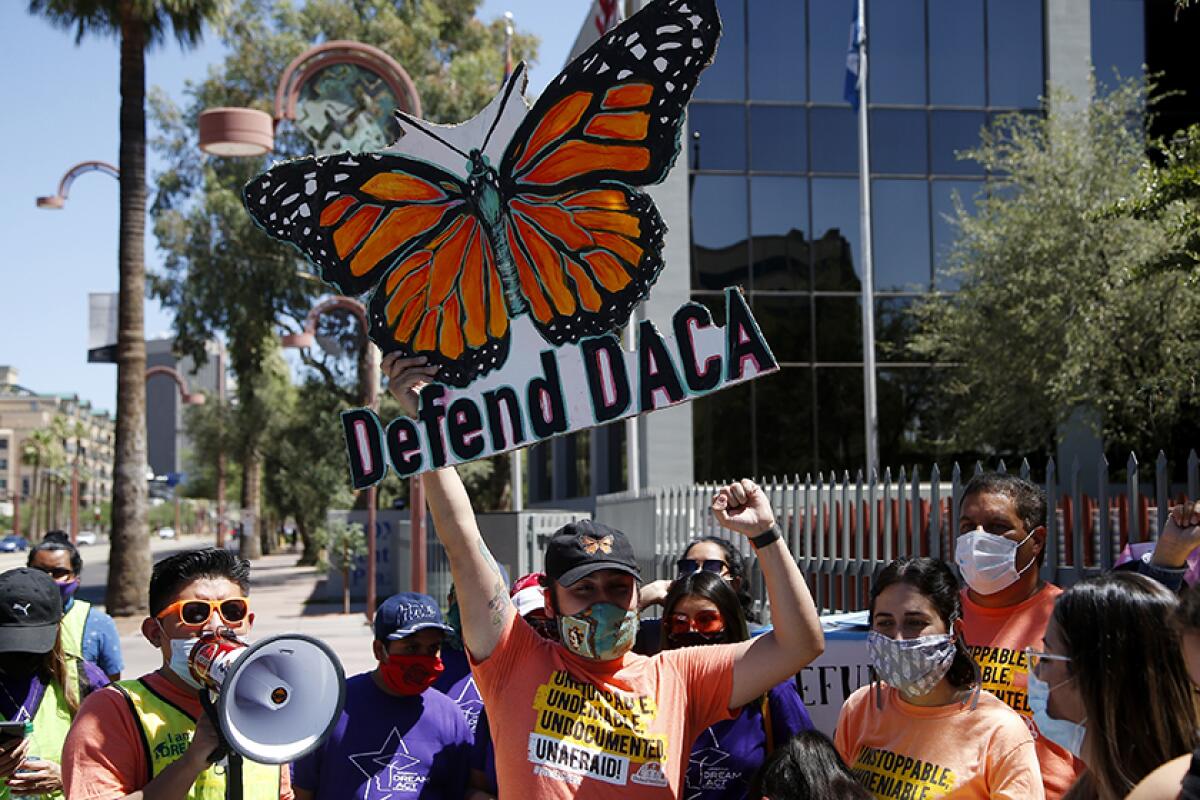Op-Ed: Protect the Dreamers. The U.S. needs doctors-in-training like me

I am a proud undocumented medical student attending the UCLA School of Medicine — a reality that still seems like a dream. It is a reality because of the 2012 Deferred Action for Childhood Arrivals policy, or DACA. However, the DACA program and its beneficiaries remain in jeopardy as the policy could be ended by a court ruling any day now. If Congress does not pass legislation this year, nearly 700,000 DACA recipients — including teachers, parents, students and nurses — will be at risk of being forced out of the workforce and subjected to the threat of deportation.
I decided that I was going to pursue medicine during my third year in college. I hoped to become a physician whom folks like my family could identify with and rely on — even though because of my immigration status, it was clear from the beginning that I might never be able to practice as a physician in the U.S. I made the decision to pursue a medical career in spite of this, because it’s important to me that my community is represented in healthcare. I wasn’t deterred by the fact that I didn’t know any undocumented medical students or undocumented practicing physicians. Living in constant uncertainty for as long as I can remember, I’ve had to develop a sense of resiliency to push past roadblocks and continue pursuing my goals.
When DACA passed in 2012, I remember feeling excited and relieved, like a weight had been lifted off of me. The policy provides temporary work authorizations and protections from deportation to qualifying young undocumented immigrants who came to the U.S. as children.
Deportation protections have given me a sense of security so that I can continue living in my hometown without fear of being suddenly uprooted. They have allowed me to pursue medical school.
Work authorization also is vital to the policy’s success, enabling DACA recipients to participate more fully in the labor force, provide for their families and enrich their communities. It has opened the door to many professional growth opportunities for me including working at a high school as a college advisor, eligibility for scholarships and access to other coveted clinical experiences and pre-med related programs. While DACA is only a temporary solution, it has provided me a path to become the physician my community needs.
I will be graduating in a year as an obstetrician and gynecologist. But as I yearn to celebrate my graduation, the program that has given me so many opportunities faces its greatest threat to date.
In July, the Fifth Circuit Court of Appeals heard oral arguments for Texas vs. U.S., a case that challenges the legality of the DACA program, and a negative decision is expected to be handed down soon. The ruling could end the ability this year for current DACA recipients to renew their protections. That would mean that I and 110,000 other Dreamers who work in the health fields will not be able to use our specialized skills and degrees in the workforce. In fact, if DACA ends, approximately 1,600 DACA recipients working in healthcare would be forced out of their jobs each month for the next two years. This would be devastating for the U.S. economy and for the patients across the nation who rely on these workers.
The Bureau of Labor Statistics predicts that employment in healthcare will grow by 13% between 2021 and 2031. The U.S. is expected to have a physician shortage of as many as 124,000 by 2034. This would profoundly affect communities of color, already underserved and receiving lower-quality care than their white counterparts. The undocumented students who aspire to work in the medical field are equipped to fill this gap, many having lived through the challenges of accessing healthcare themselves, but we may soon be unable to do so. The nation needs a permanent legislative solution.
If I am allowed to become a physician and practice here in the U.S., I will continue fighting against health inequities and engage in research and mentorship to empower immigrant communities. My career would also provide the financial stability needed to build my life in the U.S. — the only place I’ve ever known — allowing me, one day, to purchase my first home and start a family. However, with the DACA program in jeopardy, my aspirations of giving back to my community through healthcare and establishing a future in the U.S. hang in the balance.
Congress has failed for decades now to provide a permanent legislative solution for Dreamers, using the existence of DACA as an excuse for inaction. However, time is nearly up; lawmakers must immediately pass permanent protections for Dreamers and affirm that they are part of the fabric of our country.
Yadira Bribiesca is a student at the UCLA School of Medicine.
More to Read
A cure for the common opinion
Get thought-provoking perspectives with our weekly newsletter.
You may occasionally receive promotional content from the Los Angeles Times.










